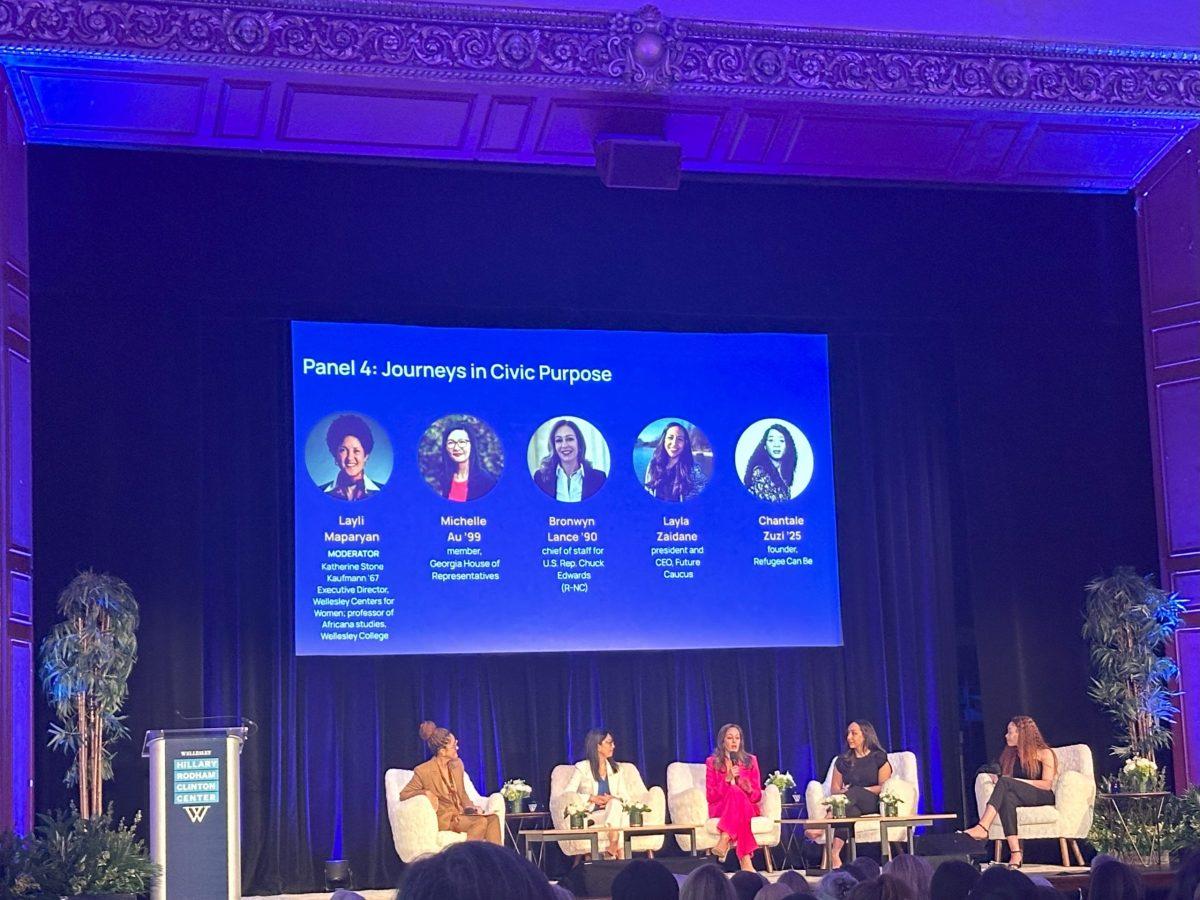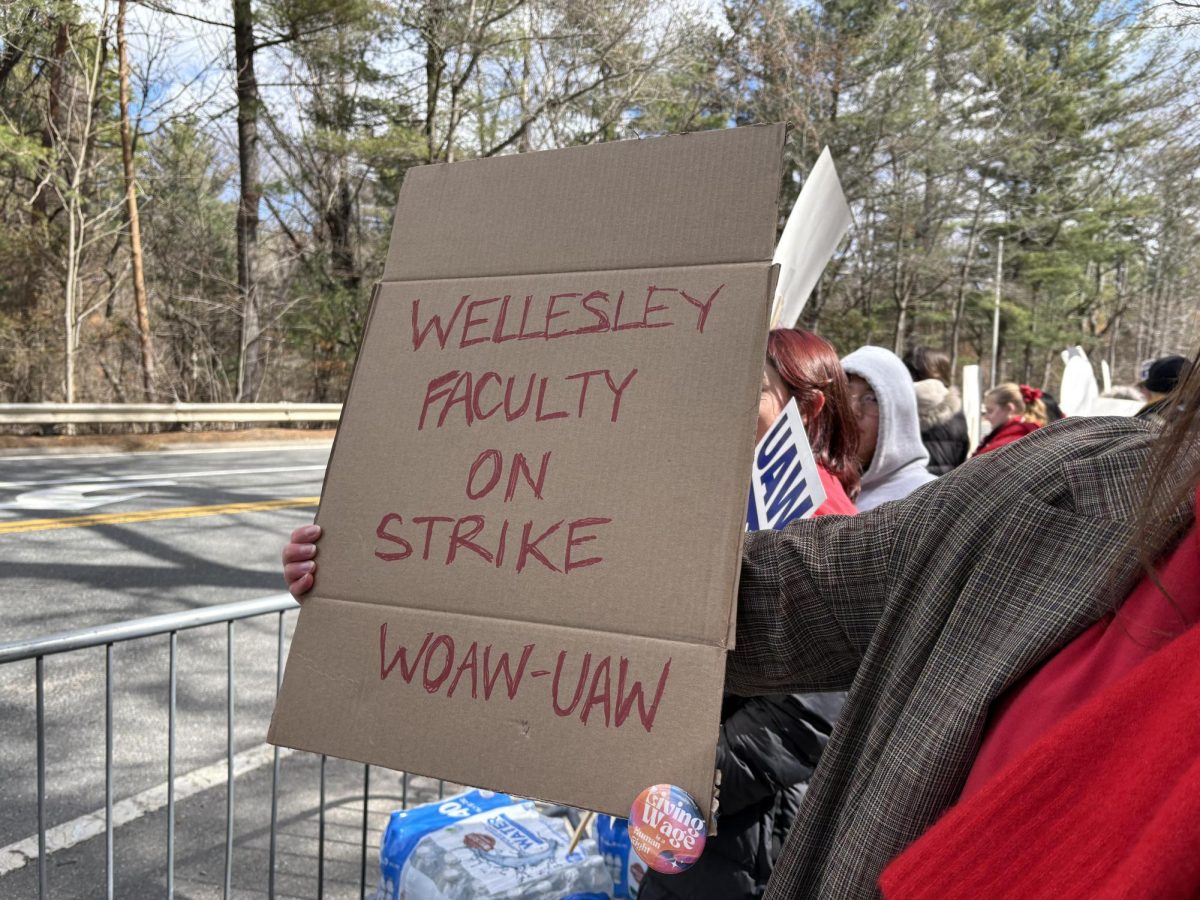On April 6, 2024, several notable people arrived at Wellesley College to participate in the Renewing Democracy Summit and speak to students, staff and alums about democracy and how their specific work has changed the ways communities see the democratic process. This was all on behalf of the Hillary Rodham Clinton Center (HRCC), a new collective founded this year that, according to their website, “provides a forum for students, faculty, and staff to engage with each other and with civic innovators to explore the challenges democracy faces and to forge solutions.”
But the arrival of Hillary Clinton to Wellesley, amidst the ongoing war in Gaza, sparked opposition from students. It led those participating in the Summit, as well as just those present at Wellesley College, to question the teachings of the Center and the goal of its programs. Students wondered if the summit’s mission of democracy renewal could be legitimate given Clinton’s legacy, and, further, if the mission of promoting democracy was upheld by Wellesley administration, given their actions towards students protesting against the summit. Wellesley College appeared divided by this question.
The day started with opening remarks by Arielle Mitropoulos ’19, anchor and reporter at WMUR-TV and notable recent alum of Wellesley, and President Paula Johnson. Both spoke about the need for the HRCC in this modern age and how Wellesley students are making change.
President Johnson expressed her admiration for Wellesley College, and each student’s drive to “[make] what seems impossible possible.”
President Johnson was especially adamant that democracy was at a crossroads, as she put it, and that the HRCC was steering its participants and their voices towards promoting collective action and democratic change. Through programs like The Clinton Fellows sophomore experience, Faculty Research Initiative and annual summits, that goal would be realized with the help of students, faculty and alumni. After the two spoke, several panels populated by all sorts of political experts began: from worldwide challenges, to misinformation threats in a digital age, to higher education and its role in democracy, democratic struggles were addressed and democratic solutions were proposed. Among those participating were Nobel Peace Prize winners Leymah Gbowee and Maria Ressa, Michigan Secretary of State Jocelyn Benson ’99, current student and non-profit founder Chantale Zuzi ’25, and Massachusetts Governor Maura Healey, as well as the namesake of the foundation herself, Hillary Rodham Clinton ’69.
Each of the speakers discussed the ways in which their specific field impacted democracy, continuously emphasizing the power of individuals to make change. As it was said during the first panel, it is a critical year for democracy, and Wellesley students need to be aware of the ways in which they can make change.
Chelsea Miller — co-founder of Freedom March NYC — put it aptly: “It is not enough to say we have found an issue; we also need to put in the work to fix [it].”
It seemed from every angle that the main priority of the Summit was to encourage democracy, to promote social change that started from the ground up, and to create discourse and discussion that leads to growth.
As Zuzi put it, “People are scared of the other,” and only by facilitating equal discussion can we overcome fear and hatred to create a more democratic world.
Clinton believes there is no better place to do this than Wellesley; as she said in her closing remarks, the Center will “make sure our hopes, dreams and fears as women … [are] recognized and respected.”
But despite the consistent push for democracy that occurred within the Summit, and the HRCC’s plans for promoting that democracy on campus, there was significant backlash from a portion of the student body. When the speakers of the Summit were announced, students took issue with the presence of Clinton on campus, as well as the founding of a Center in her name. The Instagram account @wc_against_hrc was created before the Summit occurred, and in the bio of the account, it states, “Against the HRC Center’s complicity in Palestinian occupation.” The creators also wrote a statement expressing their issues with the HRCC, and with their choice to use Clinton as a figurehead for a new center on democracy, despite her actions during and after her time as Secretary of State.
The statement says that the HRCC “hypocritically lacks in their programming … transparency about the present greatest humanitarian crisis; the ongoing genocide in Gaza,” and that “Hillary Rodham Clinton has supported and abetted to wrongful violence committed against Palestinian life and land.” They also critique the College for its active choice to give Clinton a platform, despite her past actions, and that they do not support someone who is “deaf to reason and deaf to the demands of the majority.”
The account also posted about various protests and events leading up to the Summit, which complies with the now-updated demonstration policy introduced this year, and organized demonstrations both at President Johnson’s house and outside the Summit. Another significant action taken by students was the “Dear Hillary” magazines, pamphlets posted on every student’s door that broke down, in detail, the actions Clinton had taken or encouraged that contributed to human rights crises, especially focusing on the Middle East and Palestine. On the day of the Summit, the voices of students outside Alumnae Hall could be heard across campus and within the building, as they chanted about their opposition to Clinton and the importance of Palestinian freedom.
Despite the administration’s alert to the student body that any disruption within the Summit would be dealt with, four students disrupted the Summit and spoke up. When entering the Summit, attendees were notified through slips of paper that “students who are disrupted will be asked to leave the premises immediately and will be charged with Honor Code violations of disorderly conduct and/or failure to comply with directives of a college administrator.” The slip further cited the high-security concerns of the event and that cases would be dealt with on an administrative level. The justification was to respect the panelists and to allow for free expression, while still allowing students to protest outside and make their voices heard.
The disruptions happened during Clinton’s two panels, one at the beginning and the conversation at the end between Clinton and President Johnson regarding the vision for the Summit. Disruptors called on Hillary Clinton’s foreign policy decisions, the ongoing violence in Gaza, and the panel’s decision to talk about democracy while ignoring the war in Gaza. Clinton responded by offering to talk after the event and Mitropoulos highlighted the importance of having difficult conversations, even if one does not agree with them. Gbowee asked students to come together in a collective way in productive protest, while also reminding everyone to not discourage courage.
Students who disrupted the event have since been in talks with administration regarding what decision will be dealt with. An anonymous student disruptor mentioned their main motivation for speaking up was “standing up for justice in Palestine.”
The disruptor mentioned that while they had not coordinated with others to protest inside, as it wouldn’t be fair to pressure students to take that risky of an action, there was some degree of coordinated efforts for those individuals who knew the risk and ultimately decided to protest. The student had tried asking questions about Palestine through the virtual Q&A tool offered to attendees but the forum was being moderated — any questions about Palestine were deleted or didn’t get approved and there was no way to bring it up inside the event. The demonstration outside was loud but mics inside were turned up so students attending wouldn’t have to hear it.
The student ultimately decided to protest to “bring awareness inside the event and make it impossible to ignore.” Along with the three other disruptors, the student is facing consequences, something they see as incredibly dangerous for the precedent it places for free speech on campus. “With the stuff that’s happening at Barnard and Columbia, it is a very big moment for the student movement on college campuses right now,” the student said. “Students are risking their housing, education, and degrees to stand in solidarity with people in Palestine … these students should be celebrated and not evicted.”
In the aftermath, discussion of how the Honor Code violation was operating — as an administrative resolution rather than a student-led council decision — continued to spark discussion about the undemocratic decisions of the college administration. When speaking at Senate, the representative for the Honor Council said that the violation was considered “disorderly conduct and/or failure to comply with administration,” and while there was a theoretical chance for students to appeal this decision, there was no clear opportunity for the student body to defend the students who had protested. Noticeably, neither President Paula Johnson nor Dean Sheilah Shaw Horton were present at the following Senate, and at the most recent Senate on April 22, administration adjourned before students could question the Honor Code principles.
The events at the Summit, alongside protests happening at college campuses around the country, pose questions about the power that students and college governments have when it comes to freedom of speech and expression, especially in the context of Palestine. Honor Code incidents are being treated differently than they have in the past, and avenues that are being provided for speech on campus are narrow. An email from Wellesley’s College Government condemned the use of administrative resolution, the overriding of the Honor Code Council procedure that is meant to “protect the rights of students,” and the dangerous precedent it sets for free speech at Wellesley. In a time where democratic backsliding is a concern both at home and around the world and efforts are being made to renew dialogue and hope for democracy, such as at Wellesley through the establishment of the HRCC, it is crucial to reflect on the role that freedom of speech, expression, and dissent play in a democratic society.
To sum it up, the Hillary Rodham Clinton Center’s Renewing Democracy Summit created discourse on campus. On one hand, the speakers that took part in it promoted democratic ideas, and have made headway on positive democratic progress in their respective fields. They talked about the resources available to students, both through the HRCC and outside of it, and the ways in which students could make a change. On the other hand, students saw the actions of the administration in regards to the summit as undemocratic.
Student organizers wrote in their statement, “To invite a war criminal to preach democracy is beyond hypocritical …The Wellesley administration adds a further layer of hypocrisy through the continued repression of student dissent while their Summit and Center preach ‘civil discourse.’”
Even students who participated in the pilot program of the Civic Action Fellowship later released statements condemning Clinton, with many of the leaders participating in the program leaving after Clinton shut down conversations about Palestine when meeting with them.
Those who left the Civic Action Fellowship said, in their statement, “They saw students as threats to the execution of this perfection [of a program], and nothing more.”




